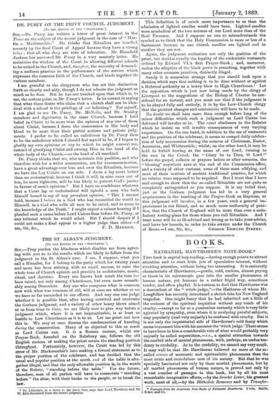THE ST. ALBAN'S JUDGMENT.
go THE EDITOR OF THE "SPECTATOR.") Sin,—Pray pardon the blindness which disables me from agreeing with you as to the results which are likely to follow from the judgment in the St. Alban's case. I am, I suppose, what you call a Ritualist, for I belong to the party which for twenty years and more has been striving, with no small success, to raise the whole tone of Church opinion and practice in architecture, music, ritual, and doctrine. Every one knows hofr much the tone has been raised, not only among Churchmen, but even more remarkably among Dissenters. Any one who compares what is common now with what was common of old, will at once see whether or no we have so far succeeded in our efforts. And any one can judge whether it is possible that, after having survived and overcome the Gorham judgment, and a variety of other heavy blows aimed at us from time to time, we are likely now to give way before a judgment which, where it is not impracticable, is at least as hostile to Low Churchmen as it is to us. Let me point out how this is. We may at once dismiss the condemnation of kneeling during the consecration. Many of us objected to this as much as Lord Cairns can. It is a Roman custom, whilst our Prayer-Book, founded on the Salisbury use, follows the old English custom of making the priest retain the standing position throughout. Fortunately, however, the Court was led by this error of Mr. Mackonochie's into making a formal statement as to the proper position of the celebrant, and has decided that the usual and popular position at the north end of the table is altogether illegal, and that the only allowable position is, in the words of the Rubric, "standing before the table." For the future, therefore, men of all parties will have to consecrate "standing before" the altar, with their backs to the people, or to break the law. This definition is of much more importance to us than the admission of lighted candles would have been. Lighted candles were symbolical of the two natures of our Lord more than of the Real Presence. And I suppose no one so misunderstands the symbol as to think that the Holy Communion is more or less of a Sacrament because in one church candles are lighted and in another they are not.
Again, the judgment authorizes not only the position of the priest, but decides equally the legality of the eucharistic vestments ordered by Edward VI.'s first Prayer-Book ; and, moreover, makes the adoption of the black gown iu preaching, together with many other common practices, distinctly illegal.
Surely it is somewhat strange that you should look upon a decision which says that nothing is to be done without or against a Rubrical authority as a heavy blow to High Churchmen ! Let the opposition which is just now being made by the clergy of Liverpool to the suggestions of the Bishop of Chester be considered for an instant, and you must see that if the judgment is to be obeyed fully and entirely, it is by the Low-Church clergy that the greatest changes and concessions will have to be made.
No doubt we shall hear more than enough before long of the minor difficulties which such a judgment us Lord Cairns has delivered will involve us in. The exact obedience to the Rubrics which he insists on will involve consequences of very varying importance. On the one hand, in addition to the use of vestments and the position of the celebrant, it seems to compel daily celebration of holy communion during the octaves of Christmas, Easter, Ascension, and Whitsuntide ; whilst, on the other hand, it may be held to forbid bowing at the name of our Lord, turning to the east in the Creed, the "Glory be to Thee, 0 Lord !" before the gospel, collects or prayers before or after sermons, the "blessing" anywhere save at the end of the Communion office, and a variety of other customs, some of them most edifying, and most of them matters of ancient traditional practice, for which no rubrics were supposed to be required. But I trust that I have said enough to show that the so-called Ritualists are not quite so completely extinguished as you suppose. It is my belief that, just as the Gorham judgment has led to a very general acquiescence in the teaching of the Prayer-Book on Baptism, so this judgment will involve, in a few years, such a general improvement in our Ritual, and so much more uniformity of practice, that the Church of England will be more than ever a satisfactory resting-place for those whom you call Ritualists. And I trust none will be so ill-advised and wrong as to take your advice, and leave her bounds, in order to take service under the Church
of Rome.—I am, Sir, 8ce., GEORGE EDMUND STREET.










































 Previous page
Previous page